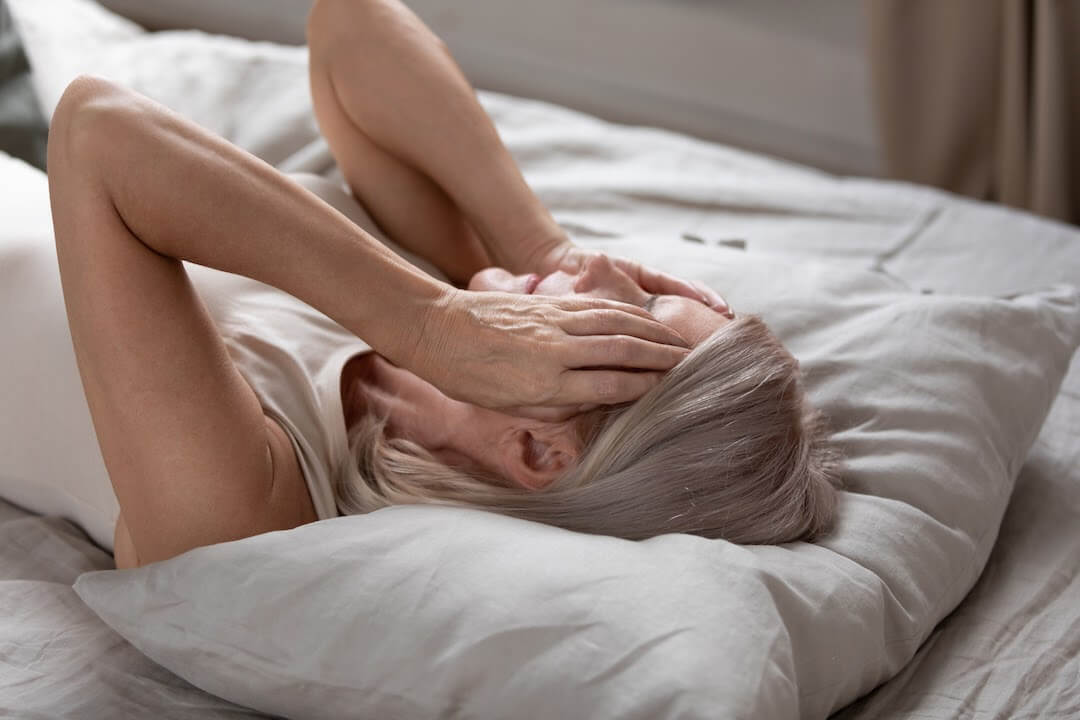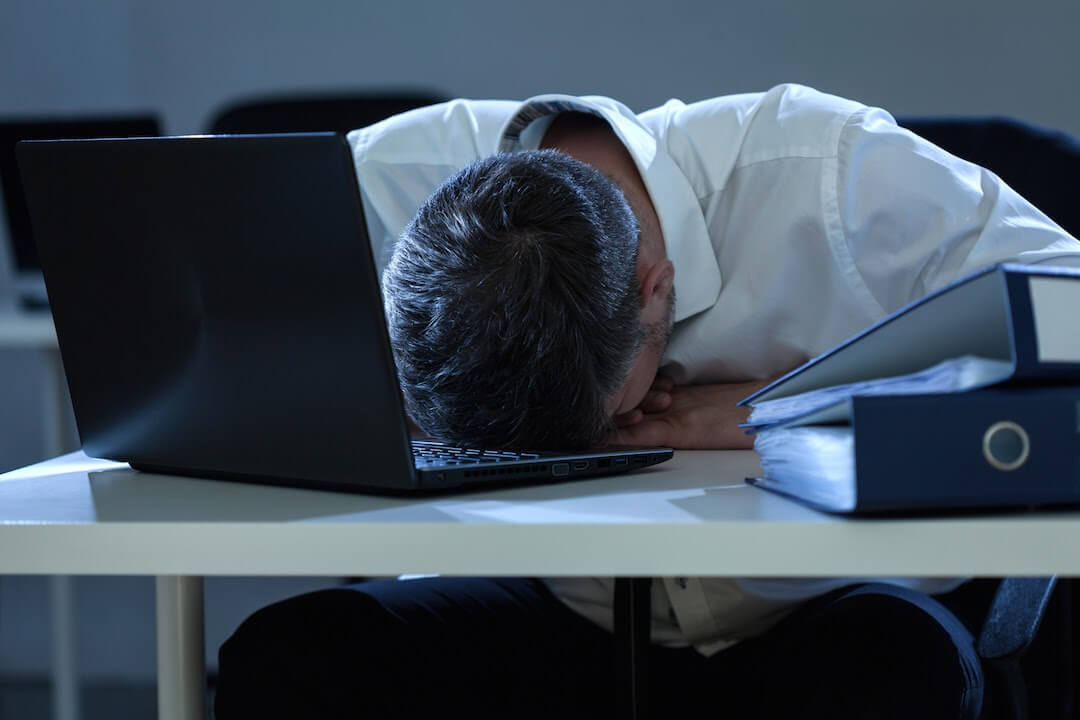Having a hard time either falling asleep or getting a full night of rest? Stress could be the reason you aren’t getting enough sleep, because stress and sleep are so closely tied to each other.
There’s a good chance you’re already familiar with how troublesome stress can be when it comes to getting quality sleep. Maybe it’s anxiety brought on by work, or simply the day-to-day stress that comes with raising a family that’s keeping you up at night. Regardless of the cause, you’ve likely found yourself with your head on your pillow, mind racing, and struggling to get to sleep at some point in your life.
This isn’t surprising. Overall, most Americans suffer from routine stress. A 2017 Gallup poll found nearly 80% of U.S. adults suffer from either occasional or frequent stress; only 17% of respondents, on the other hand, said they rarely feel stressed.
Those figures may look even more dire if a survey was taken today.
Millions of Americans are now experiencing even more stress as a result of the economic and health-related uncertainty brought on by the coronavirus pandemic. One federal crisis hotline dedicated to helping those with mental health issues has seen an 891% surge in calls compared to last year, largely due to the COVID-19 outbreak.
Left untreated, stress can contribute to several health issues, including sleep disorders like insomnia.
What can make this a frustrating issue to resolve is that the relationship is bidirectional: stress can cause poor sleep, and poor sleep can lead to increased stress and anxiety. Let’s dive deeper into the close relationship between stress and sleep.
How Stress Impacts the Body and Leads to Poor Sleep
The human body simply isn’t designed to get great sleep while stressed — and there’s a biological explanation for this.
When you’re dealing with stress, the body releases more hormones, including adrenaline and cortisol, the main stress hormone. At the same time, more sugar, or glucose, enters the bloodstream, which leads to a spike in blood pressure.
Soon after, your body is functioning at an accelerated rate due to stress. Your heart is pumping, your muscles tense up, and your mind is racing. This reaction is better known as the “fight or flight” response, which is an innate survival instinct that kicks in when we’re facing danger.
That reaction is what often derails quality sleep. The human body is hardwired to stay awake when stressed; it’s a response that kept our ancestors alive thousands of years ago when dealing with threats, whether from animals or rival tribes.
Different Types of Stress: Acute Versus Chronic Stress
Acute stress, or short-term stress, can be a roadblock to quality sleep on a temporary basis. Anyone who has fretted about a big presentation at the office or at school understands this dynamic. Still, those instances are not permanent and don’t often lead to lingering health issues.
Chronic stress, however, can lead to serious sleep ramifications. Chronic stress develops when the body’s stress levels have been heightened for at least several weeks. There are numerous factors that can lead to long-term stress. Those factors include high-pressure jobs, relationship problems, financial concerns, the death of a friend or family member, or anxiety over external issues, like COVID-19.
When chronic stress sets in, the body functions while growing more accustomed to higher cortisol levels. Researchers have found higher cortisol levels have been linked to sleep deprivation, or a serious lack of sleep, as well as sleep problems like insomnia.
It’s recommended for Adults to generally get at least 7 hours of sleep each night. Chronic stress can not only prevent adults from getting 7 hours of sleep, but it can block the path to healthy, restorative rest. It can also lead to serious health issues like heart disease, diabetes, depression, and hypertension.
Symptoms of Chronic Stress
There are a number of signs you are suffering from chronic stress, beyond having trouble sleeping, including:
- Fatigue
- Consistent headaches
- Diminished libido
- Difficulty staying focused
- Major changes in appetite
- Feeling sick more frequently than usual
Poor Sleep Can Make Stress Worse
This is where it can be frustrating for both those suffering from chronic stress, along with those who treat it: stress and sleep isn’t a one way street. Instead, both can impact the other and make the issue worse.
Poor sleep can and does contribute to increased stress levels. It often doesn’t take long for poor sleep to affect your mood, either. Last year, researchers from the University of California, Berkeley found one sleepless night can lead to a 30% increase in emotional stress levels. That’s because sleep plays a key role in regulating mood and helping the body and mind work their best. Without sufficient sleep, our bodies are unable to properly regulate stress.
Again, there’s a biological reason for this. Research has shown that sleep deprivation can lead to a 37-45% increase in cortisol levels the following evening. Higher cortisol levels, as mentioned earlier, stand in the way of good sleep by activating the body’s natural fight-or-flight response system.
Stress and sleep are interconnected, and poor sleep often manifests itself in increased feelings of anxiety and stress — which in turn leads to worse sleep. It can be a never ending and exhausting cycle.
Related: Most Americans Need Better Sleep
Health Issues Tied to Chronic Stress
The long-term ramifications of chronic stress can be severely damaging. The following are some of the health problems that have been linked to chronic stress:
- Anxiety
- Sleep deprivation
- Heart disease
- Weight gain
- Memory loss
Both acute and chronic stress have also been tied to insomnia, which is characterized by either an inability to fall asleep or having problems falling back asleep after waking up during the night.
“Stressful life events are closely associated with the onset of chronic insomnia and are mediated by certain predisposing personality factors,” said researchers from one study examining the stress-insomnia connection. Insomniacs, the study found, tend to be “more discontent” as both children and adults, while also showing “inadequate coping mechanisms for dealing with stress.” In other words: traumatic events can contribute to insomnia, and at the same time, people who exhibit an inability to manage stressful situations are more vulnerable to developing insomnia.
Related: 7 Common Causes of Insomnia
Can COVID-19 Lead to Worse Sleep?
There’s good reason to believe coronavirus-related stress could be impacting the sleep of millions of Americans.
That’s because the social distancing tactics undertaken to mitigate the spread of COVID-19 can come with their own drawbacks. Loneliness is one obvious byproduct that can stem from compelling citizens to stay away from friends and family for a long period of time. And this is something to be mindful of when it comes to getting quality sleep.
Researchers have found loneliness is a key driver of both acute stress and chronic stress. The 2014 study, published in the Journal of Clinical and Diagnostic Research, directly connected loneliness to poor sleep, which, as mentioned above, often stems from acute and chronic stress. The researchers also found loneliness contributes to daytime fatigue, which is another factor that can negatively impact a person’s sleep schedule.
Why loneliness is a facilitator of chronic stress is still being researched. One potential reason, though, is that humans are pre-programmed to be social creatures; this goes back thousands of years and stems from a feeling of safety that comes with traveling in a group, rather than being isolated.
To counteract this feeling — and remove another obstacle that stands in the way of quality sleep — it’s important to find ways to stay connected to friends and family, even while practicing social distancing. Setting up Zoom or Skype video conference calls, along with calling loved ones on the phone, is an easy place to start.
Small steps to stay connected right now can help alleviate the added stress that comes with following coronavirus-related news, and can also help you get better sleep.
Next Steps: Managing Stress and Potential Solutions
The first objective when it comes to the stress-sleep cycle is apparent: reduce stress. By reducing anxiety and stressful situations, it provides an excellent foundation for achieving good sleep.
This is often easier said than done, of course. But there are a few tips, courtesy of the National Institute of Mental Health, worth following to reduce acute stress.
Steps to Help Reduce Acute Stress
- Regular exercise: 30 minutes per day can offer a mood boost
- Practice breathing exercises
- Try relaxation techniques such as guided meditations
- Track your accomplishments: write down your daily “wins” at the end of the day; focus on your accomplishments, not where you came up short
- Keep your loved ones informed: if you’re dealing with the effects of stress, be sure to talk to others about it. Whether it’s your friends, family, a religious guide, or a counselor, don’t bottle up your trauma
However, if your stress symptoms have lasted for more than a month, it might be time to reach out to a health professional and see if you’re suffering from chronic stress. And remember, stress and sleep function as a two-way street. If you’re concerned a sleep disorder like sleep deprivation is compounding your mood, be sure to contact Sleep Centers of Middle Tennessee. Our team has decades of experience treating 90 different sleep disorders; we can help pinpoint if a sleep problem is fostering chronic stress.
References
Suchecki, D., et al. (2012). REM sleep rebound as an adaptive response to stressful situations. Frontiers in Neurology 3(41). Retrieved on April 24, 2020 from:
https://www.ncbi.nlm.nih.gov/pmc/articles/PMC3317042/#__ffn_sectitle
Minkel, J., et al. (2014). Sleep deprivation potentiates HPA axis stress reactivity in healthy adults. Health Psychology 33(11): 1430-1434. Retrieved on April 23, 2020 from:
https://psycnet.apa.org/record/2014-19532-001
Simon, B., et al. (2020). Overanxious and underslept. Nature Human Behaviour 4: 100-110. Retrieved on April 23, 2020 from:
https://www.nature.com/articles/s41562-019-0754-8#citeas
Leproult, R., et al. (1997). Sleep loss results in an elevation of cortisol levels the next morning. Sleep 20(10): 865-70. Retrieved on April 24, 2020 from:
https://www.ncbi.nlm.nih.gov/pubmed/9415946
Basta, M., et al. (2007). Chronic insomnia and stress system. Sleep medicine clinics 2(2):279-291.
Retrieved on April 24, 2020 from:
https://www.ncbi.nlm.nih.gov/pmc/articles/PMC2128619/
Mushtaq, R., et al. (2014). Relationship between loneliness, psychiatric disorders and physical health? A review on the psychological aspects of loneliness. Journal of clinical and diagnostic research 8(9):WE01-WE4. Retrieved on April 24, 2020 from:
https://www.ncbi.nlm.nih.gov/pmc/articles/PMC4225959/


